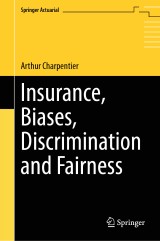Details
Insurance, Biases, Discrimination and Fairness
Springer Actuarial
|
149,79 € |
|
| Verlag: | Springer |
| Format: | |
| Veröffentl.: | 13.05.2024 |
| ISBN/EAN: | 9783031497834 |
| Sprache: | englisch |
Dieses eBook enthält ein Wasserzeichen.
Beschreibungen
This book offers an introduction to the technical foundations of discrimination and equity issues in insurance models, catering to undergraduates, postgraduates, and practitioners. It is a self-contained resource, accessible to those with a basic understanding of probability and statistics. Designed as both a reference guide and a means to develop fairer models, the book acknowledges the complexity and ambiguity surrounding the question of discrimination in insurance. In insurance, proposing differentiated premiums that accurately reflect policyholders' true risk—termed "actuarial fairness" or "legitimate discrimination"—is economically and ethically motivated. However, such segmentation can appear discriminatory from a legal perspective. By intertwining real-life examples with academic models, the book incorporates diverse perspectives from philosophy, social sciences, economics, mathematics, and computer science. Although discrimination has long been a subject of inquiry in economics and philosophy, it has gained renewed prominence in the context of "big data," with an abundance of proxy variables capturing sensitive attributes, and "artificial intelligence" or specifically "machine learning" techniques, which often involve less interpretable black box algorithms.<p></p><p>The book distinguishes between models and data to enhance our comprehension of why a model may appear unfair. It reminds us that while a model may not be inherently good or bad, it is never neutral and often represents a formalization of a world seen through potentially biased data. Furthermore, the book equips actuaries with technical tools to quantify and mitigate potential discrimination, featuring dedicated chapters that delve into these methods.</p>
Introduction.- <b>Part I Insurance and Predictive Modeling.- </b>Fundamentals of Actuarial Pricing.- Models: Overview on Predictive Models.- Models: Interpretability, Accuracy and Calibration.- <b>Part II Data.- </b>What Data?.- Some Examples of Discrimination.- Observations or Experiments: Data in Insurance.- <b>Part III Fairness.- </b>Group Fairness.- Individual Fairness.- <b>Part IV Mitigation.- </b>Pre-processing.- In-processing.- Post-processing.
<b>Arthur Charpentier</b>, is an actuary (member of the International Actuarial Association), holds an MSc from ENSAE (Ecole Nationale de la Statistique, Paris, France) and a PhD in applied mathematics from KU Leuven (Belgium). After having been a professor in various institutions (mainly in France, ENSAE, Ecole Polytechnique, University of Rennes), he is now a professor at UQAM, Montreal. He has published several books in actuarial science and insurance modeling (including Mathematics of Non-Life Insurance, Computational Actuarial Science with R and more recently a Handbook of Insurance in French), as well as research and popularization articles, and is on the editorial board of some actuarial journals (ASTIN Bulletin, Risks, and the Journal of Risk and Insurance).
This book offers an introduction to the technical foundations of discrimination and equity issues in insurance models, catering to undergraduates, postgraduates, and practitioners. It is a self-contained resource, accessible to those with a basic understanding of probability and statistics. Designed as both a reference guide and a means to develop fairer models, the book acknowledges the complexity and ambiguity surrounding the question of discrimination in insurance. In insurance, proposing differentiated premiums that accurately reflect policyholders' true risk—termed "actuarial fairness" or "legitimate discrimination"—is economically and ethically motivated. However, such segmentation can appear discriminatory from a legal perspective. By intertwining real-life examples with academic models, the book incorporates diverse perspectives from philosophy, social sciences, economics, mathematics, and computer science. Although discrimination has long been a subject of inquiry in economics and philosophy, it has gained renewed prominence in the context of "big data," with an abundance of proxy variables capturing sensitive attributes, and "artificial intelligence" or specifically "machine learning" techniques, which often involve less interpretable black box algorithms.<p></p><p>The book distinguishes between models and data to enhance our comprehension of why a model may appear unfair. It reminds us that while a model may not be inherently good or bad, it is never neutral and often represents a formalization of a world seen through potentially biased data. Furthermore, the book equips actuaries with technical tools to quantify and mitigate potential discrimination, featuring dedicated chapters that delve into these methods.</p>
An account of fairness in predictive models Discusses fairness issues arising from big data and algorithms Addresses a topic of high interest to actuaries and regulators
Diese Produkte könnten Sie auch interessieren:

Linear and Integer Programming vs Linear Integration and Counting

von: Jean-Bernard Lasserre

96,29 €

Reactive Search and Intelligent Optimization

von: Roberto Battiti, Mauro Brunato, Franco Mascia

96,29 €















